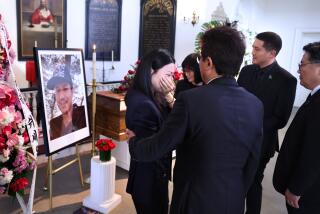Psychiatric Study Probes Lower Drug Doses Among Asians
- Share via
TORRANCE — When he was a medical resident in psychiatry at the National Taiwan University medical school, Dr. Keh-Ming Lin became accustomed to prescribing drugs for patients suffering from schizophrenia and depression.
But after he became a resident physician in psychiatry and behavioral sciences 10 years ago at the University of Washington in Seattle, Lin began to notice that larger drug doses were being given in the United States for the same illnesses.
“There was a most drastic change from Taiwan to Seattle,” Lin recalled, ticking off the questions that formed in his mind: Are patients in America over-medicated? Is this a choice of physicians who want to “get results” faster? Are Asians more timid about drugs and unwilling to tolerate the side effects of heavier doses?
The questions led to a presumption that because there was no qualitative difference between the progress of Asian and non-Asian patients despite differences in drug doses, Asians must require lower levels of drugs than Caucasians. He said this difference, which appears to extend even to third-generation Asians in America, must stem from specific physiological and cultural reasons.
Now a psychiatrist at Harbor-UCLA Medical Center and coordinator of minority mental health services in the county Department of Mental Health’s coastal region, Lin is probing his presumption in a research project involving 33 volunteers. They include equal numbers of American-born Asians, foreign-born Asians and Caucasians.
The study, to be completed in June under a $15,000 grant from the National Institute of Mental Health, will determine if Asians require smaller drug doses and, if so, why. It will focus on such things as differences in body weight, diet--Asians tend to eat less red meat, and protein may inhibit drugs from reaching the brain--and cultural attitudes toward drugs. Asians are “more cautious about medication and raise more questions about it,” he said.
Lin said that drug tolerance is only one of several things that differentiates the occurrence and treatment of mental illness in Eastern and Western cultures.
“Basic diseases--schizophrenia and depression--occur at the same rate in all cultures, but they manifest themselves in different ways,” Lin said.
Immigrants who began arriving in the United States as refugees after the fall of Ho Chi Minh City (Saigon) a decade ago, suffer from the combined traumas of recalling the violent destruction of their homelands and learning to live in a new, alien culture. They have “three to four times” the stress level of other Asians, Lin said.
American-born Asians experience cultural confusions, wondering how much they belong to the world of their parents’ past and how much to the world of their own present.
“They ask, ‘How much am I different from my friends, and the people I deal with? How much have I received from my parents?’ ” he said, adding that after 10 years in the United States, he sometimes asks himself, “Would the Chinese accept me?”
He said all Asians have a tendency to hide feelings, endure emotional pain, and refrain from reaching out for help. Refugees have a worse time of this because “they do not have much awareness of psychiatric services, which are usually a last resort when they become very sick,” Lin said.
The mental health department’s coastal region, stretching from Malibu to Long Beach, includes about 140,000 Asians, ranging from fairly recent immigrants to people who have been here for several generations. Lin said the South Bay has significant Asian communities in Gardena, Carson and Hawthorne.
According to the county, only a small portion of these people are ever served by the public mental health system, because of limited services as well as the Asian tendency not to seek help. Dr. Milton Miller, coastal region director, said both Asians and Latinos are low users of services in comparison to their share of the population.
“By the time the Asian shows up, he has been hidden by the family for so long that he is desperately sick and takes longer to recover,” Miller said.
“More traditional cultures tend to keep problems within the family and do not reach the mental health professional,” Lin said.
Clashes between what Lin terms “Asian traits” and those of the dominant American culture are the hallmarks of Asian psychiatric problems.
More to Read
Sign up for Essential California
The most important California stories and recommendations in your inbox every morning.
You may occasionally receive promotional content from the Los Angeles Times.









